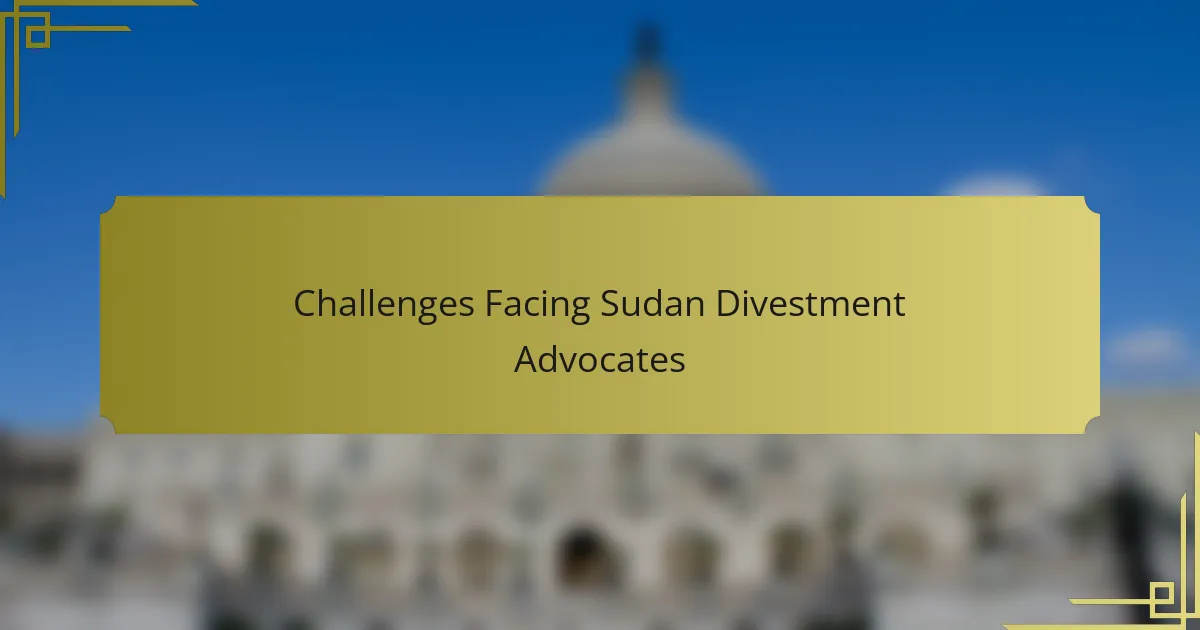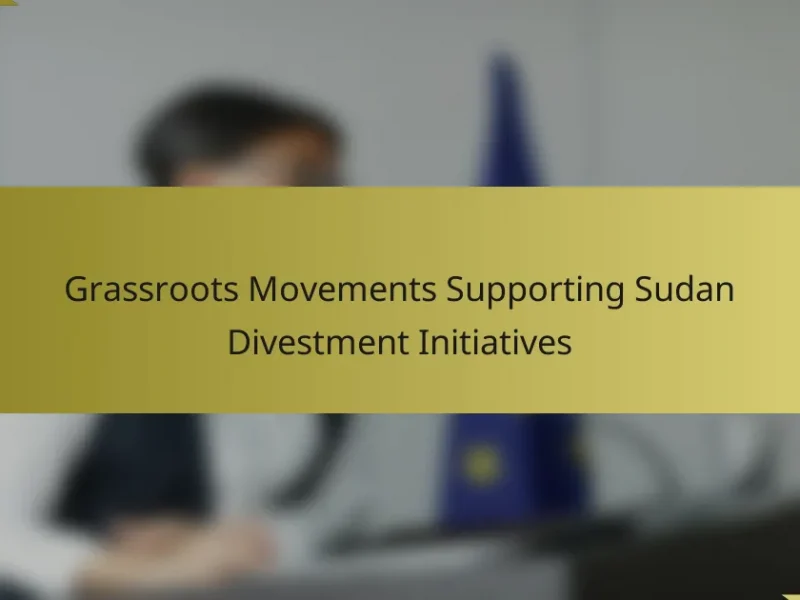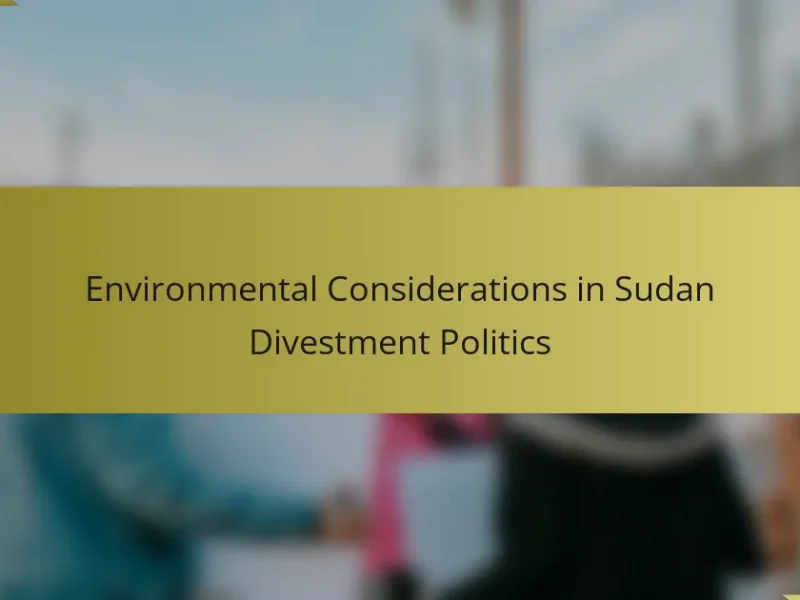Sudan divestment advocates encounter numerous challenges that hinder their efforts to promote economic and ethical divestment from Sudan. Key obstacles include a lack of coordinated international support, complex internal political dynamics, and entrenched economic interests that resist external pressures. Additionally, advocates face difficulties in raising public awareness due to limited media coverage, which affects their ability to mobilize support for divestment initiatives. Legal and regulatory hurdles, including compliance with investment laws and existing contractual obligations, further complicate divestment efforts. The influence of public perception is critical, as heightened awareness can lead to increased pressure on corporations to withdraw investments, thereby enhancing the effectiveness of advocacy campaigns.
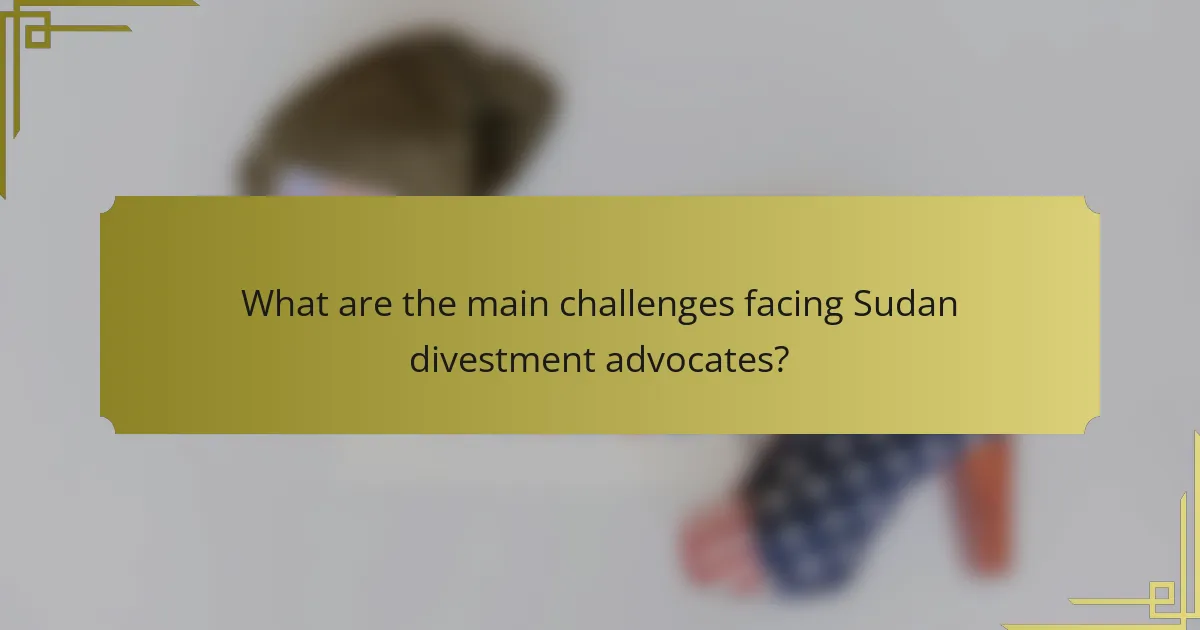
What are the main challenges facing Sudan divestment advocates?
Sudan divestment advocates face several significant challenges. One major challenge is the lack of comprehensive and coordinated international support. Many countries have inconsistent policies regarding Sudan, making unified action difficult. Additionally, there is a complex political landscape within Sudan itself, which complicates divestment efforts. The presence of entrenched interests in Sudan’s economy often resists external pressures. Furthermore, advocates struggle with the challenge of raising public awareness about the situation in Sudan. Limited media coverage can hinder efforts to mobilize support. Financial implications also present a challenge, as divesting can lead to economic consequences for stakeholders involved. Lastly, there is often a lack of transparency regarding companies’ operations in Sudan, making it difficult to track compliance with divestment initiatives.
Why is divestment a critical strategy for Sudan?
Divestment is a critical strategy for Sudan to reduce funding for oppressive regimes. By withdrawing investments, stakeholders can pressure the government to change its policies. This strategy aims to promote human rights and social justice. Historical evidence shows that divestment campaigns have successfully influenced governmental behavior in other nations. For instance, the divestment movement against apartheid in South Africa led to significant political reforms. Additionally, divestment can hinder the financial resources available for conflict and violence in Sudan. As a result, it serves as a tool for international advocacy and solidarity.
What are the historical context and motivations behind Sudan divestment efforts?
Sudan divestment efforts emerged primarily in response to the humanitarian crises and human rights abuses occurring in the country. The Darfur conflict, which began in 2003, highlighted severe atrocities, including genocide and ethnic cleansing. Activists and organizations sought to pressure the Sudanese government by advocating for divestment from companies operating in Sudan.
The motivations behind these efforts included raising awareness of the humanitarian situation and holding the Sudanese government accountable. In 2006, the Sudan Divestment Task Force was established to guide investors on how to divest.
By 2010, several U.S. states had enacted divestment laws targeting Sudanese companies. These legislative actions were aimed at reducing financial support for the regime. The divestment movement gained traction as public support grew, fueled by grassroots campaigns and media coverage of the crisis.
Overall, the historical context of Sudan divestment is deeply rooted in the pursuit of justice for victims of violence and the desire to influence change through economic pressure.
How does divestment impact the political landscape in Sudan?
Divestment impacts the political landscape in Sudan by reducing financial resources for the government. This financial pressure can lead to increased instability and push for political reform. When international investors withdraw, it signals disapproval of government actions. This disapproval can galvanize local and international advocacy for change. Furthermore, divestment may weaken the government’s ability to fund military operations. As a result, it creates space for opposition movements to gain traction. Historical cases show that economic pressure can influence political dynamics significantly. For example, divestment in South Africa during apartheid contributed to political change. In Sudan, similar trends may emerge as advocacy for divestment continues.
What obstacles do advocates encounter in their efforts?
Advocates encounter several obstacles in their efforts for Sudan divestment. One significant challenge is a lack of awareness among the general public. Many people do not fully understand the complexities of the situation in Sudan. This limits public support and engagement. Additionally, financial interests often hinder divestment initiatives. Companies may prioritize profits over ethical considerations. Political resistance also poses a barrier. Policymakers may be reluctant to take action due to diplomatic relations. Furthermore, misinformation can spread easily, complicating the advocacy message. These factors collectively impede the effectiveness of advocacy efforts for Sudan divestment.
How do economic factors hinder divestment initiatives?
Economic factors significantly hinder divestment initiatives by creating financial risks and uncertainties. Investors often fear potential losses from divestment, particularly in volatile markets. The dependence on fossil fuels in many economies makes divestment a financially daunting decision. Additionally, companies may face pressure to maintain profitability, discouraging them from abandoning lucrative investments. Economic stability is crucial for divestment success, and instability can lead to resistance from stakeholders. In Sudan, ongoing conflict and economic challenges further complicate divestment efforts. The World Bank reports that Sudan’s economy has been heavily impacted by sanctions and instability, making divestment initiatives particularly challenging.
What role do international relations play in these challenges?
International relations significantly influence the challenges faced by Sudan divestment advocates. Diplomatic ties shape the effectiveness of advocacy efforts. When countries impose sanctions, it can pressure the Sudanese government. Conversely, strong international alliances may hinder divestment initiatives. The role of international organizations, such as the UN, is crucial in addressing human rights issues. Their involvement can amplify the voice of advocates. Additionally, geopolitical interests often complicate the divestment landscape. Countries may prioritize strategic partnerships over ethical considerations. This dynamic creates obstacles for advocates seeking to promote change in Sudan.
What strategies can advocates employ to overcome these challenges?
Advocates can employ several strategies to overcome challenges in Sudan divestment. They can build coalitions with other organizations to amplify their message. Collaborating with influential stakeholders can increase visibility and credibility. Engaging in grassroots mobilization helps raise public awareness and support. Utilizing social media effectively can spread information quickly and widely. Advocates should also focus on educating policymakers about the importance of divestment. Providing clear data and case studies can strengthen their arguments. Regularly updating supporters on progress can maintain momentum and enthusiasm. These strategies have proven effective in similar advocacy efforts, demonstrating their potential impact.
How can coalition-building enhance the effectiveness of divestment campaigns?
Coalition-building enhances the effectiveness of divestment campaigns by uniting diverse stakeholders. This unity amplifies the campaign’s reach and visibility. A coalition can bring together organizations, activists, and community members. Each group contributes unique resources and expertise. This collective strength can lead to more impactful messaging. For example, a broader coalition can attract media attention. Increased visibility can pressure targeted entities to divest. Additionally, coalitions can share best practices and strategies. Collaborative efforts often result in more comprehensive and persuasive campaigns.
What are the best practices for raising awareness about Sudan divestment?
Engaging in grassroots campaigns is a best practice for raising awareness about Sudan divestment. Grassroots movements can mobilize community support and influence public opinion. Utilizing social media platforms amplifies the message to a broader audience. Sharing personal stories and testimonials can create emotional connections and drive engagement. Collaborating with local organizations enhances credibility and reach. Hosting informational events educates the public on the implications of divestment. Leveraging data and statistics about Sudan’s socio-economic conditions supports the argument for divestment. Regularly updating supporters on progress maintains momentum and encourages ongoing involvement.
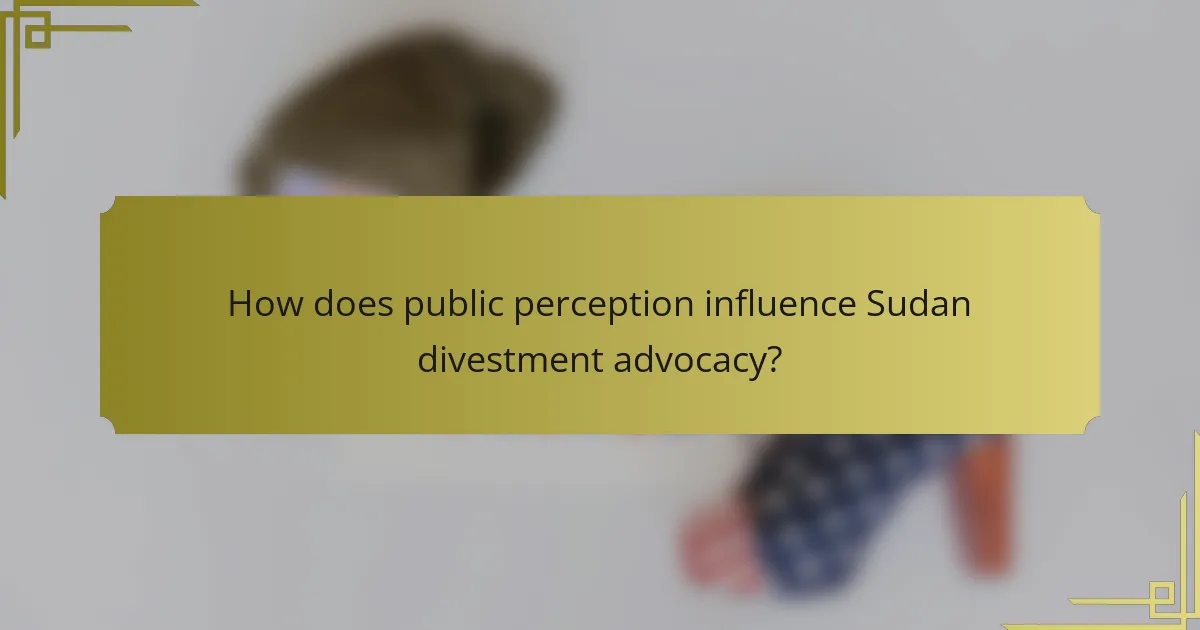
How does public perception influence Sudan divestment advocacy?
Public perception significantly influences Sudan divestment advocacy by shaping the narrative around the humanitarian crisis and economic sanctions. Advocates rely on public awareness to garner support for divestment initiatives. When the public perceives the situation in Sudan as dire, advocacy efforts gain momentum. Increased public concern can lead to higher pressure on corporations to withdraw investments. This pressure is often reflected in social media campaigns and public demonstrations. Studies show that heightened awareness can translate into actionable support, enhancing the effectiveness of divestment campaigns. For instance, campaigns that successfully mobilize public opinion often see increased media coverage, further amplifying their message. Thus, public perception acts as a catalyst for advocacy efforts aimed at divesting from Sudan.
What misconceptions exist about divestment efforts in Sudan?
Misconceptions about divestment efforts in Sudan include the belief that divestment alone can effect change. Many think that withdrawing investments will directly lead to improved conditions in the country. However, divestment may not significantly impact the Sudanese government’s policies or actions.
Another misconception is that divestment is universally supported by all stakeholders. In reality, some investors and companies oppose divestment, arguing it may harm local economies. This opposition can hinder the effectiveness of divestment campaigns.
Additionally, there is a belief that divestment efforts are solely focused on economic factors. In fact, these efforts often encompass human rights and ethical considerations. This broader focus can complicate the messaging and goals of divestment advocates.
Lastly, some assume that divestment campaigns are well-coordinated and strategic. In practice, these campaigns may lack unified leadership and direction, leading to fragmented efforts.
How can advocates address and correct these misconceptions?
Advocates can address and correct misconceptions by providing accurate information and engaging in open dialogue. They should create educational materials that clarify the issues surrounding Sudan divestment. Hosting community forums allows advocates to discuss misconceptions directly with stakeholders. Collaborating with experts can lend credibility to their claims. Utilizing social media campaigns can spread factual information quickly. Sharing personal stories from affected individuals humanizes the issue and counters myths. Research shows that informed communities are more likely to support divestment efforts. For instance, a study by the International Crisis Group highlights the importance of awareness in driving advocacy success.
What impact does media coverage have on public opinion regarding Sudan divestment?
Media coverage significantly shapes public opinion regarding Sudan divestment. Increased media attention raises awareness about the humanitarian crisis in Sudan. This heightened awareness often leads to greater public support for divestment initiatives. Research indicates that positive media framing can mobilize grassroots activism. For instance, coverage highlighting the impact of divestment on improving conditions in Sudan can influence public sentiment favorably. Conversely, negative or limited media coverage may result in apathy or opposition to divestment efforts. Studies show that public perception often aligns with the narratives presented in the media. Therefore, effective media strategies are crucial for advocates seeking to promote Sudan divestment.
How can advocates effectively communicate their message?
Advocates can effectively communicate their message by using clear, concise language. They should tailor their message to the audience’s values and interests. Engaging storytelling can help make complex issues relatable. Visual aids like infographics can enhance understanding. Utilizing social media platforms expands reach and engagement. Consistent messaging across multiple channels reinforces key points. Building coalitions with other organizations can amplify their voice. Lastly, gathering and presenting data can provide credibility and support their arguments.
What channels are most effective for reaching target audiences?
Social media platforms are the most effective channels for reaching target audiences. They allow for targeted advertising and engagement with specific demographics. Research shows that 54% of social media users utilize these platforms for product research. Email marketing also remains effective, with a return on investment of $42 for every dollar spent. Content marketing through blogs and videos can build trust and authority. Webinars and online events provide interactive opportunities for engagement. Utilizing these channels can significantly enhance outreach efforts for advocates.
How can storytelling be utilized to strengthen advocacy efforts?
Storytelling can strengthen advocacy efforts by creating emotional connections. It humanizes the issues at stake and makes them relatable. Personal narratives can illustrate the impact of policies on individuals’ lives. This approach fosters empathy and motivates audiences to take action. Research indicates that stories can increase engagement by up to 22 times compared to facts alone. Effective storytelling can also simplify complex issues, making them easier to understand. By sharing compelling stories, advocates can mobilize support and drive change.
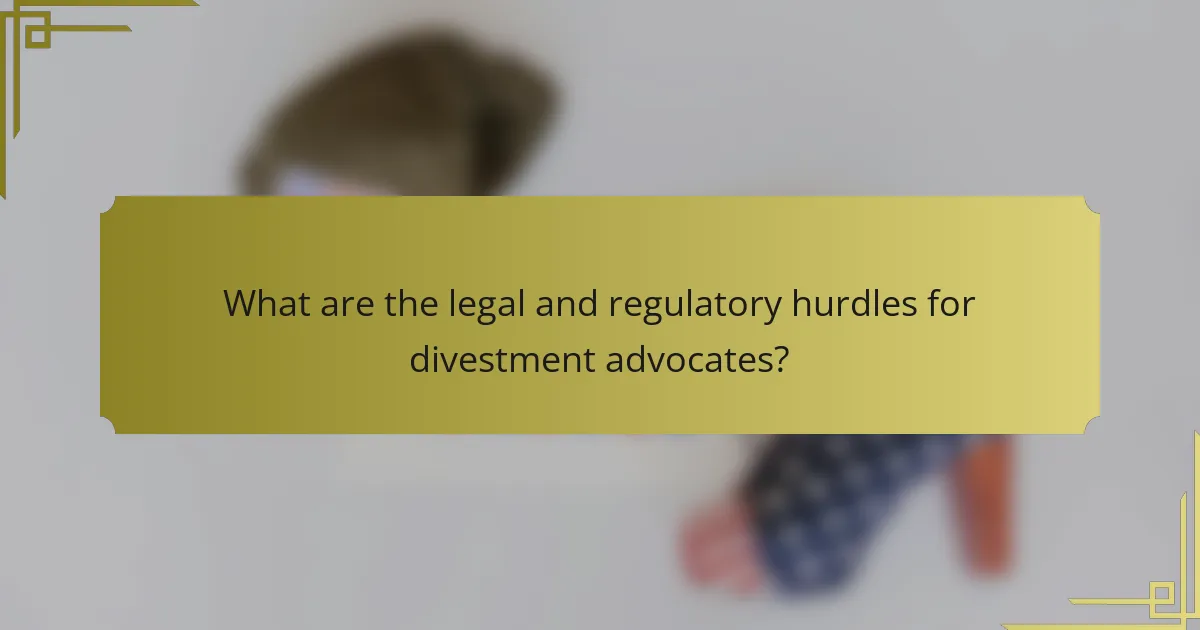
What are the legal and regulatory hurdles for divestment advocates?
Divestment advocates face several legal and regulatory hurdles. These hurdles include compliance with existing investment laws. Advocates must navigate state and federal regulations that govern divestment actions. Many jurisdictions have laws that require a fiduciary duty to maximize returns. This duty can conflict with divestment goals aimed at social or ethical considerations. Additionally, advocates encounter challenges related to contractual obligations. Existing contracts may prohibit divestment without substantial justification. There are also risks of litigation from stakeholders opposing divestment. These legal complexities can deter institutions from pursuing divestment strategies.
What legal frameworks govern divestment activities related to Sudan?
The legal frameworks governing divestment activities related to Sudan include U.S. federal laws and state-level legislation. The U.S. Sudan Accountability and Divestment Act of 2007 allows states to divest from companies doing business in Sudan. This act was enacted in response to the humanitarian crisis in Darfur. Additionally, various states have implemented their own divestment laws targeting Sudanese investments. These laws often require public pension funds to divest from companies involved in the Sudanese oil and military sectors. Furthermore, international sanctions imposed by the U.S. and the United Nations also influence divestment activities. These sanctions restrict trade and investment in Sudan, particularly in sectors that support the government. The combination of federal and state laws creates a complex legal landscape for divestment advocates.
How can advocates navigate these legal challenges?
Advocates can navigate legal challenges by understanding relevant laws and regulations. They should conduct thorough research on legal frameworks affecting divestment. Engaging with legal experts can provide clarity on complex issues. Building coalitions with other organizations can amplify their efforts. Advocates should document all communications and actions taken. This provides a clear record in case of disputes. Staying informed about changes in legislation is crucial for compliance. Regularly attending workshops and training sessions can enhance their legal knowledge.
What recent legislative changes have impacted divestment efforts?
Recent legislative changes have significantly influenced divestment efforts. Several U.S. states have enacted laws mandating divestment from companies operating in Sudan. For instance, California and New York have implemented regulations that require state pension funds to divest from specific sectors linked to the Sudanese government. These laws are designed to pressure the Sudanese regime by limiting financial support. Additionally, federal legislation has also been introduced to encourage divestment from entities associated with human rights abuses in Sudan. Such legislative actions aim to align financial practices with ethical considerations. As a result, these changes have heightened awareness and mobilized advocacy for divestment among various stakeholders.
What role do financial institutions play in Sudan divestment?
Financial institutions play a critical role in Sudan divestment by influencing investment decisions. They can choose to withdraw funds from companies operating in Sudan. This withdrawal can pressure those companies to reconsider their presence in the country. Additionally, financial institutions can advocate for ethical investment practices. They often establish guidelines that discourage investments in regions with human rights violations. For example, the Sudan divestment movement gained momentum in the early 2000s. Many banks and pension funds began to divest from companies linked to the Sudanese government. This collective action aimed to hold the government accountable for its actions in Darfur. The effectiveness of divestment is often linked to the financial clout of these institutions. Their decisions can significantly impact the economic landscape in Sudan.
How can advocates influence the policies of financial institutions?
Advocates can influence the policies of financial institutions through targeted campaigns and strategic partnerships. They often mobilize public opinion to raise awareness about specific issues. This can lead to increased pressure on financial institutions to change their practices. Advocates may also engage in direct dialogue with decision-makers within these institutions. Research shows that advocacy efforts can result in significant policy shifts, as seen in the divestment movements related to Sudan. These campaigns often highlight ethical concerns, prompting institutions to reconsider their investment strategies. By leveraging data and personal stories, advocates create compelling narratives that resonate with stakeholders.
What are the implications of divestment for financial markets?
Divestment leads to reduced capital flow into certain sectors of financial markets. This shift can cause stock prices of targeted companies to decline. As investors withdraw funds, market liquidity may decrease. This can increase the cost of capital for affected firms. Divestment can also prompt a reallocation of investments towards more sustainable sectors. Historical examples show that significant divestment campaigns can lead to long-term financial impacts on industries. For instance, divestment from fossil fuels has resulted in lower valuations for companies in that sector. Overall, divestment alters market dynamics and investor behavior significantly.
What practical steps can advocates take to enhance their effectiveness?
Advocates can enhance their effectiveness by building strong coalitions. Collaborating with diverse organizations amplifies their reach and resources. Engaging in targeted research strengthens their arguments and credibility. Understanding the political landscape aids in crafting persuasive messages. Utilizing social media platforms increases awareness and mobilizes support. Training in public speaking enhances their ability to communicate effectively. Monitoring and evaluating their strategies help in refining their approaches. These steps are supported by successful advocacy campaigns that demonstrate the importance of collaboration and strategic communication.
What resources are available for advocates seeking to improve their strategies?
Advocates seeking to improve their strategies can access multiple resources. These include online toolkits specifically designed for advocacy. Organizations like the Advocacy Institute provide training and resources that enhance strategic planning. Additionally, platforms such as the Center for American Progress offer research and policy analysis relevant to divestment efforts. Networking opportunities through conferences and webinars also support knowledge sharing among advocates. Furthermore, social media platforms can serve as tools for outreach and mobilization. Research reports from entities like Human Rights Watch provide factual data to strengthen advocacy arguments. Access to these resources can significantly enhance the effectiveness of advocacy strategies.
How can advocates measure the impact of their divestment efforts?
Advocates can measure the impact of their divestment efforts through various quantitative and qualitative metrics. They can track financial data to assess changes in investment levels in targeted sectors. Surveys and interviews can gauge public perception and awareness regarding divestment campaigns. Additionally, advocates can analyze shifts in policy or corporate behavior following divestment. Research indicates that successful divestment can lead to a decrease in funding for harmful activities, as seen in the fossil fuel divestment movement. Data from organizations like 350.org shows that over 1,300 institutions have committed to divesting, indicating a significant collective impact.
The main entity of this article is Sudan divestment advocates, who face multiple challenges in their efforts to promote divestment as a strategy for influencing political change in Sudan. Key obstacles include a lack of coordinated international support, complex political dynamics within Sudan, limited public awareness, and financial implications associated with divesting. The article outlines the historical context of divestment efforts, the impact of public perception and media coverage, and the role of financial institutions in shaping divestment initiatives. Additionally, it discusses strategies for overcoming these challenges, including coalition-building and effective communication, while highlighting the legal and regulatory hurdles that advocates encounter.
